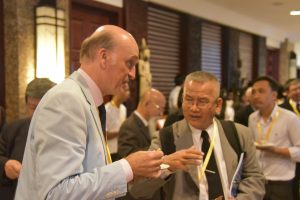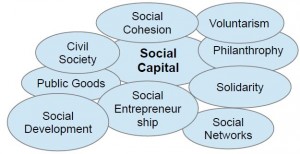Why discussions on what Social Capital is often end in the desert
Three Nobel laureates, Elinor Ostrom, Joseph Stiglitz and Amartya Sen contributed to the World Bank’s Social Capital Initative in 1999. Unfortunately the group has been „disbanded“ – that’s how Michael Woolcock, the head of the initiative, expressed it in an email to Alexander Dill of the Basel Institute in November 2015. Recently the World Bank on the occasion of the World Social Capital Monitor recovered the issue. In their report to the European Commission (p. 186) Stiglitz and Sen wrote 2009: „Bridging social capital is the most important under-measured form of social connections for many outcomes.“ But Joseph Stiglitz as well wrote: „Social capital is tacit knowledge“.
So why did it not happen? Why are so many organizations and Statistical Offices not interested in measuring and considering Social Capital?
The major reason is the reaction policy makers and officials have on what they suppose to being academic in any meaning: Let’s leave this to specialists and report in three years again.
So we try to explaining the definition, the meaning, the use and the outcome of Social Capital such as:
- Violent conflicts can only be resolved by trust, helpfulness and friendliness.
- Public goods such as security, health, education and climate care can only be funded if the citizens support them by taxes, contributions and voluntarism.
- Sovereign debt can only be repaid by the willingness of citizens to accept austerity measures and an asset levy. For both trust and solidarity are required.
- Affluence grows by people trusting and helping each other. Otherwise the transaction costs will be too high and will prohibit economical relations.
How can bridging Social Capital being measured then?
 The only eight questions of the Social Capital Assessment are available in several languages on www.trustyourplace, the survey portal of the Basel Institute of Commons and Economics. We offer a social media application to identify, to enhance, to protect and to recover core assets of Social Capital.
The only eight questions of the Social Capital Assessment are available in several languages on www.trustyourplace, the survey portal of the Basel Institute of Commons and Economics. We offer a social media application to identify, to enhance, to protect and to recover core assets of Social Capital.
The participation is anonymous and we neither require registration nor do we collect any socio-demographic data such as on political, ethnic or religious bonding. Why?
Because in most of the conflict regions they are the reason of the conflict.
Issues cutting across
Social Capital in our definition is the amount of core interpersonal perceptions among a community. In our Social Capital Assessment we are now able to quantify and to compare the Social Capital of around 150 countries today.
Of course Social Capital cuts across with a bundle of issues such as social cohesion, voluntarism, public goods and civil society.
The practical impact of Social Capital on society
While studying the literature on Social Capital you can easily get the impression that discussing ‚The concepts of Social Capital‘ is a theoretical egghead issue only. In the following interview Professor Pahlaj Moolio from the Pannasastra University of Cambodia gives examples for where Social Capital is created and required: first in the family, then in rural development, banking and tourism. The example of the newborn child he gives, sounds convincing: the baby brings friendliness as a gift into the family. This friendliness causes and inspires trust, solidarity and helpfulness. So the development of the child to becoming a valuable member of the community is built on non-material assets beyond GDP and GNP:
If we you want to learn more on Social Capital, it’s history and contributors, our recent introduction „Why Social Capital 2016?“ might be an easy way to access. The major references are linked in the article so that you can make your own picture of the major sources.
Kommentare deaktiviert für Why discussions on what Social Capital is often end in the desert
admin am 14. November 2009 in Allgemein








